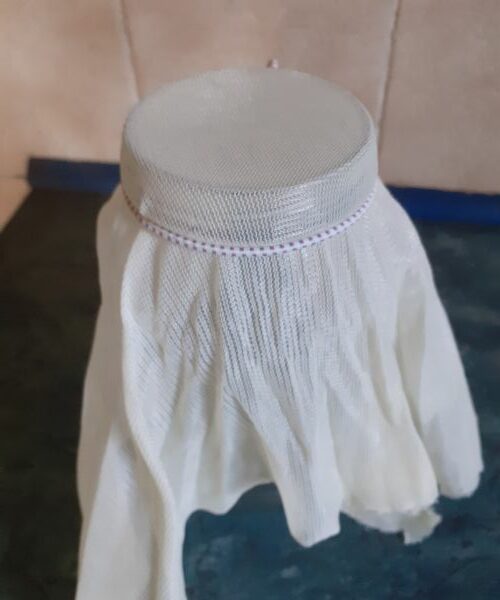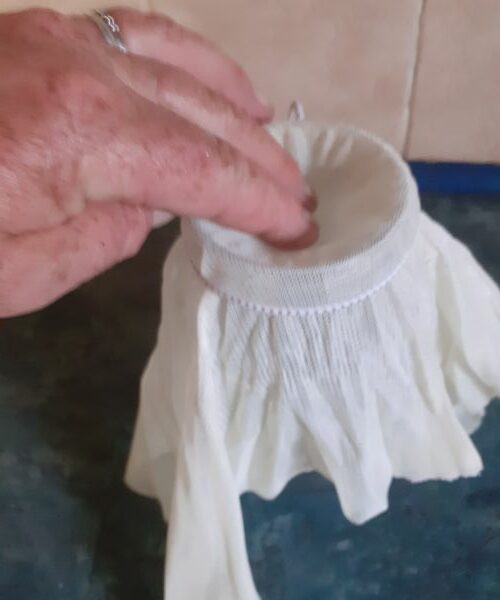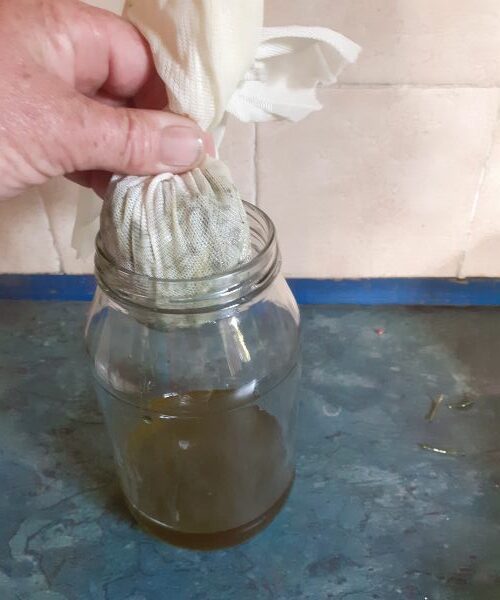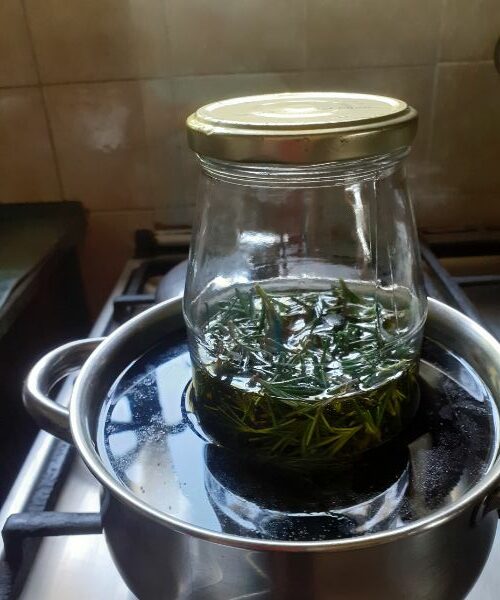Rosemary plays a starring role in the kitchen, but as part of the medicine cabinet, it really comes into its own. One of the oldest medicinal herbs in the world, rosemary has been used for centuries to improve memory and boost mood.
Useful as it is, does rosemary oil have a place in the survivalist’s first aid kit?
Well, it reduces pain and inflammation, acts as a bug repellent, eases stress, and adds flavor to meals. I don’t know about you, but I wouldn’t want to be without it, especially as it’s so easy to make.
Making rosemary-infused oil is quick and simple, regardless of your chosen method.
The first method gives you instant results, whereas the second requires some patience but may prove more potent.
How to Make Rosemary Infused Oil
Regardless of which method you opt for, the first preparatory stages of making rosemary-infused oil are the same. You need the same equipment and will harvest and process the herb similarly for each.
Step One: Getting Started
To make a rosemary oil infusion, you’ll need:
- Fresh rosemary leaves and flowers
- Oil – Jojoba oil is the best if you plan to use your rosemary oil topically. Unfortunately, I had none available, so I opted for organic olive oil. Coconut and almond oil are also suitable.
- A clean glass jar with an airtight lid
- A pot of water
- Labels

Step Two: Harvest and Process the Rosemary
Rosemary is a woody herb, so you’ll need secateurs or pruning shears to harvest it. Rosemary is best harvested just before it flowers, which is when the oils are at their peak.
Cut stems of rosemary from the plant using your secateurs before stripping the leaves from the stem with your fingers.

The easiest way to do this is by holding the stem with one hand and using the fingertips of the other hand to strip the leaves away.

You don’t need to chop the processed rosemary leaves as you would if cooking them.
How to Make Rosemary Infused Oil: Method 1
- Bring a pot of water to boil on the stove
- Place the processed rosemary leaves into a heavy-bottom saucepan
- Cover the rosemary with oil

- Place your saucepan on top of the pot of boiling water, creating a double-boiler

- Heat the rosemary and oil gently for five to 10 minutes
- Stir the mixture frequently to release the active ingredients

- Remove oil from heat and allow to cool
- While waiting for the oil to cool, sterilize a clean glass jar with boiling water.
- Secure a piece of cheesecloth or similar material to the top of the glass jar – I used some recycled net curtains (thoroughly laundered)

- Make a small indentation in the top of the cheesecloth to accommodate the leaves as you strain the oil

- Pour the oil slowly into the cheesecloth

- Gently squeeze the cloth to extract the last drops of oil before discarding the rosemary.

- Close the jar tightly before labeling it with the contents and date.
This oil is ready to use and should retain its potency for around two months if stored in a cool, dry place. To extend your rosemary oil’s lifespan further, pop it in the refrigerator, and it should be good for at least six months.
How to Make Rosemary Infused Oil: Method 2
- Sterilize a glass jar with boiling water and allow to air-dry thoroughly
- Fill the jar with fresh rosemary

- Cover the rosemary with the oil of your choice

- Pour your oil of choice into the jar until it covers the leaves.
- Bring a pot of water to boil on the stove
- Place a plate or bowl at the bottom of the pot to stop your oil concoction from getting too hot.
- Put your sealed glass jar into the saucepan and heat for five minutes to help activate the medicinal properties of the rosemary.

- Remove the jar from the saucepan and allow it to cool.
- Label the jar, noting the type of herb inside and the date it was made.
- Leave the jar in a warm place for three to four weeks.
- Once your oil is ready, strain it into another clean jar or bottle.
- Squeeze the herbs to extract the last drops of oil before discarding the rosemary.
Your oil is now ready to use. You can also transfer the oil into smaller containers or bottles for later use.
As with our previous rosemary oil infusion, kept in a cool, dry place, this concoction will retain its potency for around two months.
You can also make rosemary oil using dried leaves.
Rosemary Oil Uses and Benefits
This rosemary-infused oil has many topical uses but shouldn’t be taken internally as it can be “toxic if ingested.” Taken in large quantities, both the rosemary oil and the raw leaves can cause vomiting, sun sensitivity, and skin redness.
You can safely use rosemary oil to treat the following conditions:
#1 Relieve Digestion Discomfort
Massage rosemary oil into your abdomen to alleviate gastrointestinal complaints such as indigestion, stomach cramps, constipation, and bloating.
#2 Reduce Pain and Inflammation
Rosemary oil can be massaged into sore muscles and sprains to reduce pain and inflammation. It can also be used topically for headaches, rheumatism, and arthritis.
#3 Improve Concentration
The smell of rosemary is believed to improve concentration, boost memory, and relieve stress. Applying a little oil to your neck will give you a mental boost whenever you need it, or you could just inhale it straight from the bottle!
#4 Heal Skin Irritations
Rosemary oil has antimicrobial and antibacterial properties and, when applied to skin conditions like eczema, acne, and dermatitis, kills the bacteria while simultaneously hydrating the skin.
#5 Alleviates Respiratory Issues
Inhaling rosemary oil can help fight respiratory infections and congestion. Essential rosemary oil is better for this than a rosemary oil infusion simply because it’s more potent. Add a few drops of rosemary oil to a pot of boiling water and inhale the vapor three times a day.
#6 Stimulates Hair Growth
You probably won’t be too worried about hair growth in a survival situation, but if your hair suddenly starts falling out, the best thing to do would be to massage rosemary oil into your scalp. It’s believed to stimulate circulation in the scalp, encouraging new hair growth.
Rosemary oil can also be used as a hair tonic, which may prove handy on a long camping trip!
#7 Adds Flavor to Food
Now you know what else your rosemary oil is capable of, you probably won’t want to waste it adding a bit of flavor to your country-style squirrel or pan-fried crow.
How To Use Rosemary Oil
This rosemary oil infusion isn’t intended for internal use. Essential oils can be taken internally, but oil infusions like this one are more suited for external use.
Rosemary-infused oil is most frequently used as a massage oil. Used in this manner, it can effectively treat sore muscles, strains, joint pains, headaches, and gastrointestinal discomfort.
Rub rosemary oil into your neck to get the aromatic benefits of the herb. This will help alleviate stress, boost mood, and improve concentration.
Applying a little rosemary oil to irritated or inflamed skin will stimulate healing and relieve some of the associated pain and inflammation.
Rosemary Oil and Its Side Effects
When applied to the skin, rosemary is safe for most people. A few may have an allergic reaction to the oil, but it’s generally considered safe. Rosemary oil is not safe for internal use and could cause vomiting. Other studies suggest that internal use may also “trigger seizures in epileptic and healthy individuals.”
Studies have also found that when inhaled, rosemary oil causes “significant increases in blood pressure, heart rate, and respiratory rate.” This could prove dangerous if you suffer from high blood pressure already.
Pregnant women should avoid using rosemary oil as it could cause contractions.
Other Oils
You might also be interested in our other guides:



Thank you for the recipe! I’ve seen other similar rosemary oil recipes that require dried rosemary, what’s the difference and which is better for hair growth?
These are just two different ways of making rosemary oil. Oil made with dry herbs will generally last longer. There’s a lot of debate about which one has more viable active chemicals in it though!